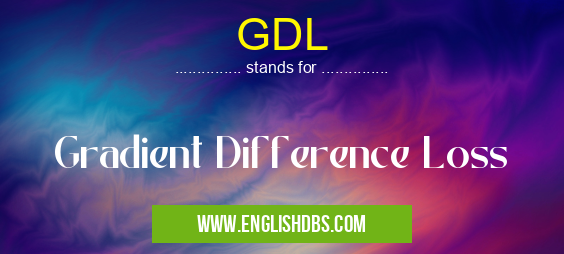What does GDL mean in UNCLASSIFIED
GDL (Gradient Difference Loss) is a loss function used in computer vision for tasks such as image reconstruction and image restoration. It measures the difference between the gradients of the generated image and the ground truth image. By minimizing the GDL, the generated image can be made more similar to the ground truth image in terms of its visual features.

GDL meaning in Unclassified in Miscellaneous
GDL mostly used in an acronym Unclassified in Category Miscellaneous that means Gradient Difference Loss
Shorthand: GDL,
Full Form: Gradient Difference Loss
For more information of "Gradient Difference Loss", see the section below.
How GDL Works
The GDL is calculated by comparing the gradients of the generated image and the ground truth image at each pixel location. The gradient of an image is a vector that describes the direction and magnitude of the change in pixel values across the image. By comparing the gradients of the two images, the GDL can detect differences in the visual features of the images.
Applications of GDL
GDL is commonly used in the following applications:
- Image Reconstruction: GDL can be used to reconstruct images from incomplete or corrupted data. By minimizing the GDL between the reconstructed image and the ground truth image, the reconstructed image can be made more accurate.
- Image Restoration: GDL can be used to restore degraded images. By minimizing the GDL between the restored image and the ground truth image, the restored image can be made sharper, clearer, and more visually pleasing.
- Image Enhancement: GDL can be used to enhance images by improving their visual features. By minimizing the GDL between the enhanced image and the ground truth image, the enhanced image can be made more vibrant, colorful, and visually appealing.
Benefits of Using GDL
Using GDL offers several benefits:
- Improved Image Quality: GDL can significantly improve the quality of generated, reconstructed, restored, or enhanced images.
- Perceptual Similarity: GDL focuses on matching the visual features of images, resulting in images that are more perceptually similar to the ground truth images.
- Flexibility: GDL can be used in a variety of image processing tasks, making it a versatile loss function.
Essential Questions and Answers on Gradient Difference Loss in "MISCELLANEOUS»UNFILED"
What is Gradient Difference Loss (GDL)?
GDL is a loss function used in image processing to measure the difference between the gradients of two images. It is commonly used in image super-resolution, where the goal is to enhance the resolution of a low-resolution image by generating a high-resolution image.
How is GDL calculated?
GDL is calculated by taking the absolute difference between the gradients of two images. The gradients are typically calculated using a Sobel operator or a similar edge detection algorithm. The resulting difference is then summed over all pixels in the image to obtain the GDL.
What are the advantages of using GDL?
GDL has several advantages over other loss functions used in image super-resolution. First, it is relatively insensitive to noise, which makes it suitable for use with low-resolution images that may contain noise. Second, GDL is able to capture fine-grained details in the image, such as edges and textures.
What are the disadvantages of using GDL?
GDL can be computationally expensive to calculate, especially for large images. Additionally, GDL can be sensitive to changes in the scale of the gradients, which can lead to instability during training.
What are some applications of GDL?
GDL is used in a variety of image processing applications, including image super-resolution, image denoising, and image segmentation. It is also used in some deep learning models for image generation and image enhancement.
Final Words: GDL (Gradient Difference Loss) is a powerful loss function that is widely used in computer vision for tasks such as image reconstruction, image restoration, and image enhancement. By measuring the difference between the gradients of the generated image and the ground truth image, GDL helps to ensure that the generated image is visually similar to the ground truth image.
GDL also stands for: |
|
| All stands for GDL |
